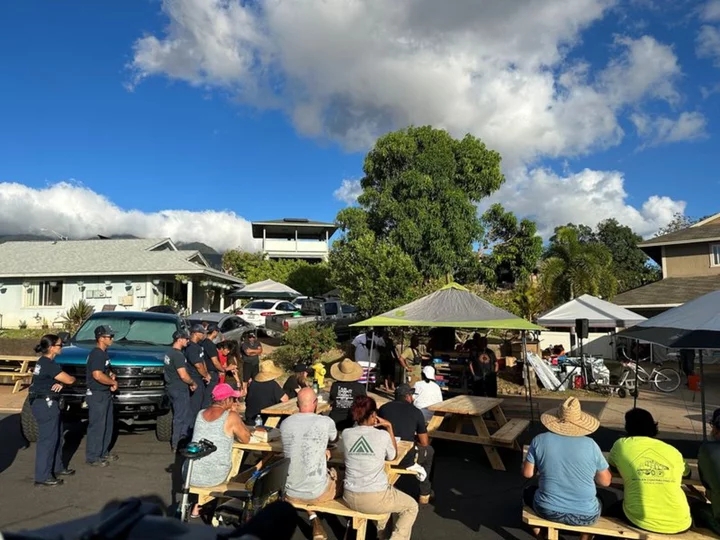By Jorge Garcia and Mike Blake
KAHULUI, Hawaii A week after a ferocious wildfire ravaged the Maui resort town of Lahaina, anxious residents were still awaiting news of hundreds of missing loved ones on Tuesday, as teams with cadaver dogs conducted a painstaking block-by-block search of the ashes.
Local, state and federal rescue workers have urged patience. The teams were proceeding as fast as possible, Maui County Police Chief John Pelletier said, but there was a "reverence" that encumbered the task of finding more of the dead, which already number at least 99 people - the most in any U.S. wildfire in more than a century.
"It's not just ash on your clothing when you take it off. It's our loved ones," Pelletier said at a Monday briefing.
The search teams had covered only a quarter of the disaster area, he said, but he expressed hope that they could scan 85% to 90% by the weekend. Officials have encouraged survivors to provide DNA samples to assist in identifying remains, a challenge made more difficult by the fire's intense heat.
The American Red Cross had received over 2,500 calls from people trying to find and reunite with relatives and friends missing from the fire, and about 800 of those have been resolved, said Chris Young, senior director for operations and readiness.
Even as donations have poured in and Hawaii and federal officials have promised vast resources to aid in the recovery, some of the displaced have grown frustrated with the pace of the governmental response.
Kanamu Balinbin, a local football coach, took matters into his own hands, setting up a relief camp where people who lost their homes and belongings could find water and food.
"I was devastated. I consider myself a strong leader, but it broke me," Balindin said about his emotions after witnessing the destruction. "This is what keeps me going, helping people. A lot of us are at that stage."
He said some of the local frustration stemmed from the longstanding perception that Maui does not receive enough attention from the state government despite its robust tourism revenues.
Only a handful of residents have been permitted back into Lahaina to visit their properties. Maui County had briefly relaxed restrictions but quickly suspended the visits on Monday after curiosity seekers clogged streets being used by rescue workers, officials said. One person was arrested for trespassing.
Lani Moala was relieved to find her home was among the few left standing, thanks to a neighbor who doused houses with a water hose as people fled. But the rest of her neighborhood was devastated.
"Everything that way was just demolished. It's just so sad," Moala said on Monday, as she pointed down the road toward the ruins.
Her extended family lost three of their five homes to the fires, including her grandmother's homestead on the edge of Lahaina. Moala said her family is finding strength and support in each other and in the close-knit Lahaina community.
"We're going to rebuild, and we're going to be Lahaina again," she said.
Some residents, however, have already expressed concern that the 19th-century capital of the Kingdom of Hawaii - long known as a cultural and historic destination - could lose its character if outside investors are permitted to buy up distressed properties.
Hawaii Governor Josh Green said he is already exploring legal options to prevent any immediate sales of properties that were damaged or destroyed.
"For my part, I will try to allow no one from out of state to buy any land until we go through this crisis to decide what Lahaina should be," he said on Monday.
Nearly 2,000 housing units, including 400 hotel rooms, 1,400 Airbnb units and 160 private homes were being made available for the displaced, Green said.
More than 3,200 Hawaii residents have registered to receive federal assistance, and that number is expected to rise, Jeremy Greenberg, the Federal Emergency Management Agency's director of response operations, told reporters.
UTILITY UNDER SCRUTINY
Fueled by winds gusting up to 80 miles (128 km) per hour, the inferno reached temperatures of 1,000 degrees Fahrenheit (538 degrees Celsius) last Tuesday when it raced from the dry grasslands outside town into Lahaina.
The deadly inferno destroyed or damaged more than 2,200 buildings, 86% of them residential, causing an estimated $5.5 billion in damage, authorities said.
It remained unclear what ignited the fires, but utility Hawaiian Electric Industries has come under increasing scrutiny over whether its power equipment played any role in setting off the blazes.
On Monday, the utility defended its decision to keep power flowing, even though Maui was buffeted last week by powerful winds fanned by a distant hurricane, raising the risk of downed lines.
Proposed class action lawsuits have been filed against the company, whose stock was down more than 20% on Tuesday after hitting a 13-year low on Monday. S&P downgraded the company's credit rating to junk status.
Hawaiian Electric CEO Shelee Kimura said the utility has no program in place to shut off electricity. Doing so would have created problems for residents who rely on powered medical equipment, she said. In addition, electricity powers pumps that provide water in Lahaina.
"There are choices that need to be made, and all of those factors play into it," she said. Kimura said the utility would investigate what, if any role, it played in the wildfires.
In California, where toppled power lines were blamed for setting off several deadly blazes in recent years, power shutdowns are a standard precaution when the risk of wildfires is high.
Hawaii officials have also vowed to review the state's emergency notification systems, after Lahaina residents said they received little or no advance warning before the fire engulfed their homes.
(Reporting by Jorge Garcia and Mike Blake in Maui; Additional reporting by Brendan O'Brien, Rich McKay, Andrew Hay, Brad Brooks, Sharon Bernstein and Dan Whitcomb; Writing by Joseph Ax and Brendan O'Brien; Editing by Frank McGurty and Jonathan Oatis)

